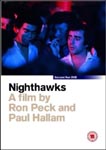

 |
Nighthawkes
|
 |
|
Ladymol's Review Times change. Sometimes you donít appreciate just how much they do change until you see something like this film! Set in the 70s in London, it portrays a world that looks so odd itís hard to believe itís within my lifetime. Jim is a geography teacher in one of the new comprehensives. (One lesson you take away from this film is never become a teacher.) That aside, Jimís life is portrayed in an almost fly-on-the-wall documentary style: random snatches with a detached eye. Heís lonely and seemed to me rather sad, wanting something but rejecting it as soon as itís offered to him. He cruises the gay bars at night, picking men up. I had to fast-forward through some dreadfully long scenes of men dancing, but I still think the film is worth giving a go. There are some quite daring scenes between Jim and the men he brings homeóone full-frontal shot of Jim that is pretty daring even today. I loved some of the kisses and genuine tenderness in otherwise painfully gauche meetings. Rent rather than buy this one, but give it a go if you like studying gay history. Cerisaye's Review Apparently this British film made in 1978 was the first to feature a gay central character neither victim nor villain, just an ordinary bloke living his life.† Now it seems very dated, a real period piece best viewed as a fascinating slice of gay history, though not without resonance today.† This was the era of sexual liberation post Stonewall/pre AIDS, when gay people were becoming increasingly visible, at least in urban centres, yet coming out was something many men were too afraid to do. †Itís gritty & grainy, an independent production made on a shoestring budget, using mostly non-professional actors and improvised dialogue.† That makes the film uncomfortable to watch, †more like fly-on-the-wall documentary than drama. Jim (who looks disconcertingly like Dudley Moore) is a geography teacher in a London comprehensive school by day and by night cruises gay bars & clubs looking for Mr. Right.† For sex, yes, but more than that: heís lonely, fed up living a double life. †What Jim seeks isnít a succession of one-night stands.† We endure painful attempts at cheerful small talk, as though sex isnít the point, excruciating morning-afters, trying to make a relationship out of a casual encounter. The film is downbeat, but I imagine accurately reflects gay experience of its time. 27 years later many gay men will identify with Jim:† the way he cruises likely partners in the meat market atmosphere of gay venues, the thrill of being with men like himself and no need to pretend to be what heís not.† The milieu is Londonís disco/club scene.† But this isnít QAF glitzy.† Even gay men looked naff in 1978!† Itís laughable what passed for fashion then.† Jim lives a circumscribed existence- his cramped flat, at school, on the scene or the grotty bedsits of his tricks.† Heís drawn to younger men afraid to be open about their sexuality.† Yet when he meets a banker whoís interested, Jim isnít, and this time heís the one who doesnít make the promised return call. The most powerful scene is in Jimís school, when a group of senior pupils ask if heís Ďbentí, a Ďqueerí.† Jim is only out to trusted colleagues, yet finds courage to answer honestly, putting his job on the line.† This incident is based on a real life case, where a teacher came out in a classroom and was sacked as a result.† This is pre Thatcher/Clause 28, but fear, ignorance and prejudice confound the right of men like Jim to enjoy the things straight people take for granted- love, happiness, family.† His pupils appear to like and respect him, so maybe they go away with a different attitude towards gay people, the beginning of change that leads to our more accepting times. The story doesnít really lead anywhere and the end is rather an anti-climax.† This does reflect real life but I felt cheated, though the way Jim stands before his class proud and unashamed leads me to think heís ready for emotional commitment. Hindsight renders that optimism poignant and bittersweet.† Only a few years later AIDS was devastating the community Jim rejoices in belonging to, setting back tolerance and promoting fear as well as killing gay men.† The filmmakers were criticised for showing gay life as promiscuous but Jimís lifestyle is realistic.† The rating is 15, so there isnít much onscreen sex- cuddling and kissing mostly- and little nudity, though there is a male full frontal. I liked the way Jimís married teacher friend filters contemporary attitudes.† Jim passes for straight, and sheís visibly shocked when his secret slips out- I think she has a crush.† As she gets to know Jim better and his history of short-term relationships, she becomes a good friend, accepting and non-judgemental.† So maybe the message is more upbeat than initial impressions indicate. This film is definitely worth watching, despite some poor acting and stilted dialogue.† If nothing else it shows maybe some things HAVE changed more than we think. |